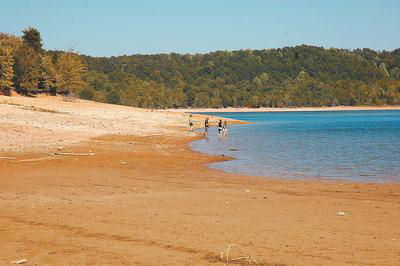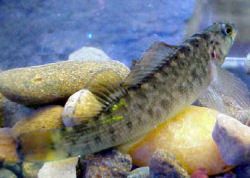|


Exceptional Drought Conditions in the Duck River Watershed
The Duck River watershed
in Middle Tennessee has been experiencing exceptional drought conditions
during the summer and fall of 2007. Service Environmental Contaminant and
Endangered Species personnel have been cooperatively working with the
Tennessee Valley Authority and Tennessee Department of Environment and
Conservation in assessing water quality and quantity issues in the mainstem
of the river downstream of Tims Ford Dam. Permanent monitoring stations have
been established at three sites. Channel cross-sections were surveyed, flow
measurements were performed, and water quality samples are being collected
to measure dissolved oxygen, ammonia, and nitrogen. These collaborative
efforts will continue until the current drought conditions subside.
Tims Ford Biological Opinion
The construction and operation of the Tims Ford Dam on the Elk River has
resulted in the drastic decline of several endangered freshwater mussels and
the endangered boulder darter.

Historical
flow regimes have been altered by the dam. Fluctuations in flow due to
hydropower peaking and releases to achieve winter reservoir pool levels have
made substrate habitats and stream-banks unstable. Lower water temperatures
resulting from hydropower generation hinder freshwater mussel reproduction.
The Environmental Contaminant program is
providing valuable assistance in formulating the Service's biological
opinion on the effects of discharges from the dam, which is influencing the
survival and recovery of listed species.
Black Oak Ridge
Historic releases of PCBs, mercury, and radionuclides resulted in
contaminated sediments that require active management and the issuance of
fish consumption advisories for Lower Watts Bar reservoir.
The Service is cooperatively
working with the EPA on clean-up and ecological risk assessments for the
Department of Energy’s (DOE) Oak Ridge Reservation (ORR).

As a member
of the ORR Natural Resources Trustee Council , the Service helped secure the
establishment of a conservation easement on a 3000-acre parcel, known
locally as Black Oak Ridge, on the ORR. Black
Oak Ridge supports a variety of habitats for game species and neo-tropical
migratory birds, including the rare cerulean warbler |

